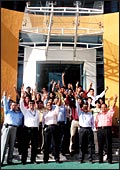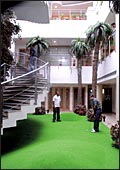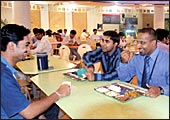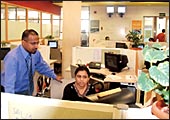 |
| United we stand: Employee first, customer
second is the company's credo |
I
am the force of one' is the dictum we urge all our employees to
follow," informs J. Kalyanaraman, Sr. Vice President (HR),
HCL Comnet, before he launches into a presentation on what an
employee means to the company. Kalyanaraman, 'Kalyan', as his
colleagues fondly call him, should know; he's been with HCL Technologies
for the last 20 years, and with HCL Comnet since its inception.
And to be sure, Kalyan is not the only one who has stuck around
with the company long enough. Business Today's Best Companies
to Work for survey results show that on an average, HCL Comnet
employees choose to spend a little less than three-and-a-half
years with the company and attrition rates are at a modest 14
per cent. This, in an industry, where companies are resigned to
losing nearly a third of their workforce each year.
In fact, if numbers are anything to go by,
HCL Comnet already has notched up an impressive set. Consider
this: the company has been growing year-on-year at well over 60
per cent, its turnover is close to Rs 500 crore, up from Rs 305
crore last year; it has expanded its workforce by a third and
now employs well over 3,000; its training budget in 2005-06 was
Rs 75 lakh, which, Kalyan says, has since risen fourfold.
SNAPSHOT
REVENUES: Rs 503
crore (2005-06)
PROFITS: Rs 38.5 crore |
Total employees: 3,047
Attrition (per cent): 13.89
Average career tenure: 3.39 years
Training budget (budgeted/actual): Rs
75 lakh
Training man-hours (actual): 103,957 |
Yet, the secret of remaining one of India's
10 best companies to work for the third year in a row does not
lie in these numbers. "We believe in the philosophy 'Employee
First'," explains Vineet Nayar, CEO, HCL Comnet and President,
HCL Technologies, the parent company. "Our employees are
the most crucial asset we have." And employees sure do seem
to have caught on to this philosophy. Survey results show a positive
internal employee feedback, with most employees surveyed rating
the company highly on the quality of work life and the level of
job security. "One important aspect that differentiates HCL
Comnet from most other companies is that it allows me to make
mistakes, thereby, giving me a chance to grow," says Rahul
Menon, a middle-level employee who heads a team of some 35 people.
"I know that the next morning I will have an office to go
to," says the man, who earlier worked for Hughes Software.
Yet, the company is not a soft employer,
as a senior company executive points out. "We give our employees
enough room to experiment and learn," he says, "and
an underperforming employee is typically given three chances,
before being asked to move on." Explains Nayar: "I do
not want bench sitters to work for me, I want people who grow
into their respective roles. I cannot play the headmaster and
punish them each time they go wrong." Anant Gupta, COO, HCL
Comnet, echoes this sentiment. "Mistakes are an important
part of the learning curve, they are inevitable."
INTERVIEW/VINEET
NAYAR/CEO, HCL COMNET
"The Start Point Of Everything Is The
Employee" |
|
 Vineet
Nayar spoke to BT's Aman Malik
on how Comnet has been the HR trendsetter within
the HCL group. Excerpts: Vineet
Nayar spoke to BT's Aman Malik
on how Comnet has been the HR trendsetter within
the HCL group. Excerpts:
You are one of the smaller companies on the list. Is
being small in any way a disadvantage?
Would you rather work for Apple or IBM? The reason we are
admired is because of our different values and because we
execute what we say. In our smallness is the value, and
it is precisely because of this value that we are becoming
very big very fast. We do not believe in volumes.
So is HCL Comnet HCL Group's Apple? Are you a cult company
within the group?
We are a not a cult company, but a catalyst company within
the group. Most things adopted by HCL Comnet, including
all our HR policies, have been replicated by HCL Technologies.
We are HCL's Apple and are also making HCL an Apple.
How has globalisation impacted the people side of business?
Globalisation has ensured free flow of capital and human
resources across countries. This has meant that competition
in the marketplace has also increased. To succeed in such
a scenario, you have to look at what differentiated value
can you really bring to the table. The search for this unique
differentiation is the compelling vision for success. So,
when we look at it, we are led to believe that it's people
who drive value. We believe in "Employee First, Customer
Second", thereby, implying that the start point of
everything is the employee. The fact that we have been registering
robust growth year-on-year, means that this dictum is working
rather well for us.
How would you typically react if an employee were to
walk up to you and tell you he lost a client?
Mistakes are healthy, because if mistakes do not happen,
people aren't learning. This is an important step in making
leaders out of people. Now, if there is a problem, the first
thing I would say is, do not surprise me. If you were aware
of such a problem, you should have sounded me out. Then,
did you do everything that could have been done to prevent
it? If you did not, do you now know what went wrong and
what should now be done to prevent it. Mistake is not the
problem, the employee has to be willing to understand he's
made a mistake.
|
The company lays a huge premium on training
its employees. It runs a 'virtual university' (christened 'Comnivarsity'),
which takes care of all training needs. Apart from an MBA programme
conducted on its premises by IMT, Ghaziabad, and a B.Tech (upgradation)
programme for diploma holders, it runs scores of in-house, domain-specific
courses and e-learning initiatives. "We figured that if an
employee wants to educate himself, he'll do it anyway," says
Gupta, "and this was what prompted us to start such courses."
 |
 |
| Teeing off: Time to exercise those legs
a bit |
Elbow room: Mistakes are seen as part
of the learning curve |
Comnivarsity is just one of the several integrated
HR practices that HCL Comnet has put in place over the years.
At the core of the company's HR infrastructure is an online system
that is a one-stop shop that addresses virtually all HR needs
of the employee, from as basic a need as figuring out his pf balance
to proposing an idea on virtually anything related to the company
to a unique ticketing system, which allows employees to air their
views and grievances to anyone up to the CEO. "We have tried
making this system as interactive as possible," informs Kalyan
as he navigates through the system. System navigators like 'Natasha',
the company mascot ("she lends a human face to the whole
interface") and 'Radio Comnet', the company's in-house fortnightly
radio newsletter, add a dash of colour to it.
Another important practice that HCL Comnet
is proud about is its 360-degree appraisal system. "Out of
the six main parameters on which a person is appraised, only one
refers to his past performance, the other five focus on what he
can potentially achieve in future," says Kalyan. Compensation
is often one of the most critical determinants of employee satisfaction.
Barring the top 15 per cent, all other employees get a fixed salary,
which is revised every year, a clear departure from an industry-wide
practice of offering as much as 30 per cent variable compensation.
"It is usually the top 15 per cent employees whose decisions
usually determine the profits of a company, so why should those
at lower levels pay if profits dip?" asks Nayar.
Despite the fact that it keeps its employees
happy, the company seems to suffer from an external image problem,
with headhunters rating it poorly. Kalyan, however, is unfazed.
"Nearly 60 per cent of our hiring happens out of employee
referrals, so we do not depend on headhunters. Moreover, since
we innovated remote infrastructure management, we know where to
tap our resources from." Nayar couldn't agree more. "What
often irks headhunters is the fact that we do not give them enough
business." he says.
Nayar and his team would have you believe
that HCL Comnet is HCL Technologies' 'Apple'. Why, you ask and
he replies, "All HR practices that were put in place by us
have now been replicated by other group companies. So our company
is a catalyst for change within the group." He should know.
Before he was elevated to HCL Tech as President in April 2005,
Nayar used to run HCL Comnet hands on. We can already bet what
Nayar is planning at HCL Tech: Apart from propelling it into tier
I of the it league, get its name on our list of 10 best companies
to work for in India.
A DAY
IN THE LIFE OF
RAHUL MENON, 30 Consultant (End-user
computing), HCL Comnet |
|
You know, his 31st birthday
is round the corner and we'll all make sure he gets his
share of 31 bums," informs a colleague as you are introduced
to Rahul Menon. Menon, a post-graduate in business administration
from Symbiosis Institute of Business Management (SIBM),
Pune, heads a team of 35 people working for a UK-based FTSE
100 chemical manufacturer. "I work UK hours,"
he says, "so, on a typical day, I reach office by noon."
This is followed by a round of meeting with his colleagues.
By the time he gets back to his desk, it is already 2 p.m.
and it's time to sift through e-mail, connect with clients
in the UK and colleagues in office. "But it's not all
work and no play, we indulge in a whole lot of banter in
office," he informs. "Usually, I am the first
one to crack up." Then, it is down to dealing with
issues related to project management and more client calls.
"Such client calls typically keep me busy till 11 p.m.,"
he says, "by when the UK business day has wrapped up
and I go home too." So, do skewed work hours affect
his personal life? "Not really," he says, "my
wife is in the same industry and keeps similar hours."
Menon, who has spent eight years in the industry (he quit
Hughes Software to join HCL Comnet two years ago), plans
to stick here for the long haul and grow with the company.
So, what endears him to HCL Comnet? "The 'Employee
First, Customer Second' philosophy, which ensures the employee,
an internal customer, remains happy and is always at his
productive best," he says.
 |
 |
 |
| Good afternoon: Menon (standing)
starts off with a meeting |
Dinner time: Stocking up before
getting back to client calls |
Tracking work: Heading a team
of 35, Menon has his hands full |
|
|






 Vineet
Nayar spoke to BT's
Vineet
Nayar spoke to BT's 



